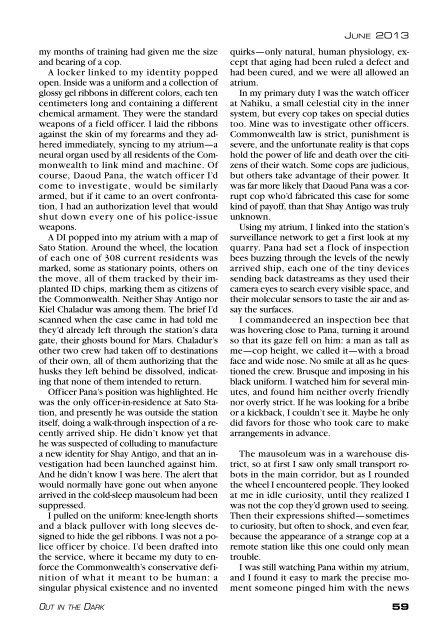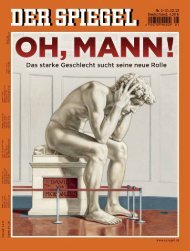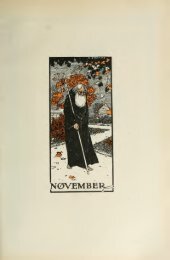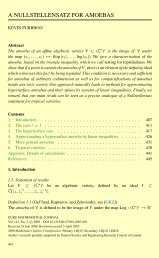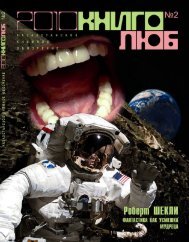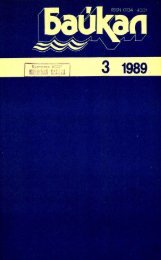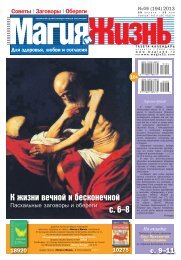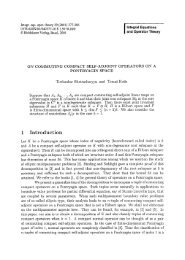Analog Science Fiction and Fact - June 2013
Analog Science Fiction and Fact - June 2013
Analog Science Fiction and Fact - June 2013
Create successful ePaper yourself
Turn your PDF publications into a flip-book with our unique Google optimized e-Paper software.
my months of training had given me the size<br />
<strong>and</strong> bearing of a cop.<br />
A locker linked to my identity popped<br />
open. Inside was a uniform <strong>and</strong> a collection of<br />
glossy gel ribbons in different colors, each ten<br />
centimeters long <strong>and</strong> containing a different<br />
chemical armament. They were the st<strong>and</strong>ard<br />
weapons of a field officer. I laid the ribbons<br />
against the skin of my forearms <strong>and</strong> they adhered<br />
immediately, syncing to my atrium—a<br />
neural organ used by all residents of the Commonwealth<br />
to link mind <strong>and</strong> machine. Of<br />
course, Daoud Pana, the watch officer I’d<br />
come to investigate, would be similarly<br />
armed, but if it came to an overt confrontation,<br />
I had an authorization level that would<br />
shut down every one of his police-issue<br />
weapons.<br />
A DI popped into my atrium with a map of<br />
Sato Station. Around the wheel, the location<br />
of each one of 308 current residents was<br />
marked, some as stationary points, others on<br />
the move, all of them tracked by their implanted<br />
ID chips, marking them as citizens of<br />
the Commonwealth. Neither Shay Antigo nor<br />
Kiel Chaladur was among them. The brief I’d<br />
scanned when the case came in had told me<br />
they’d already left through the station’s data<br />
gate, their ghosts bound for Mars. Chaladur’s<br />
other two crew had taken off to destinations<br />
of their own, all of them authorizing that the<br />
husks they left behind be dissolved, indicating<br />
that none of them intended to return.<br />
Officer Pana’s position was highlighted. He<br />
was the only officer-in-residence at Sato Station,<br />
<strong>and</strong> presently he was outside the station<br />
itself, doing a walk-through inspection of a recently<br />
arrived ship. He didn’t know yet that<br />
he was suspected of colluding to manufacture<br />
a new identity for Shay Antigo, <strong>and</strong> that an investigation<br />
had been launched against him.<br />
And he didn’t know I was here. The alert that<br />
would normally have gone out when anyone<br />
arrived in the cold-sleep mausoleum had been<br />
suppressed.<br />
I pulled on the uniform: knee-length shorts<br />
<strong>and</strong> a black pullover with long sleeves designed<br />
to hide the gel ribbons. I was not a police<br />
officer by choice. I’d been drafted into<br />
the service, where it became my duty to enforce<br />
the Commonwealth’s conservative definition<br />
of what it meant to be human: a<br />
singular physical existence <strong>and</strong> no invented<br />
OUT IN THE DARK<br />
JUNE <strong>2013</strong><br />
quirks—only natural, human physiology, except<br />
that aging had been ruled a defect <strong>and</strong><br />
had been cured, <strong>and</strong> we were all allowed an<br />
atrium.<br />
In my primary duty I was the watch officer<br />
at Nahiku, a small celestial city in the inner<br />
system, but every cop takes on special duties<br />
too. Mine was to investigate other officers.<br />
Commonwealth law is strict, punishment is<br />
severe, <strong>and</strong> the unfortunate reality is that cops<br />
hold the power of life <strong>and</strong> death over the citizens<br />
of their watch. Some cops are judicious,<br />
but others take advantage of their power. It<br />
was far more likely that Daoud Pana was a corrupt<br />
cop who’d fabricated this case for some<br />
kind of payoff, than that Shay Antigo was truly<br />
unknown.<br />
Using my atrium, I linked into the station’s<br />
surveillance network to get a first look at my<br />
quarry. Pana had set a flock of inspection<br />
bees buzzing through the levels of the newly<br />
arrived ship, each one of the tiny devices<br />
sending back datastreams as they used their<br />
camera eyes to search every visible space, <strong>and</strong><br />
their molecular sensors to taste the air <strong>and</strong> assay<br />
the surfaces.<br />
I comm<strong>and</strong>eered an inspection bee that<br />
was hovering close to Pana, turning it around<br />
so that its gaze fell on him: a man as tall as<br />
me—cop height, we called it—with a broad<br />
face <strong>and</strong> wide nose. No smile at all as he questioned<br />
the crew. Brusque <strong>and</strong> imposing in his<br />
black uniform. I watched him for several minutes,<br />
<strong>and</strong> found him neither overly friendly<br />
nor overly strict. If he was looking for a bribe<br />
or a kickback, I couldn’t see it. Maybe he only<br />
did favors for those who took care to make<br />
arrangements in advance.<br />
The mausoleum was in a warehouse district,<br />
so at first I saw only small transport robots<br />
in the main corridor, but as I rounded<br />
the wheel I encountered people. They looked<br />
at me in idle curiosity, until they realized I<br />
was not the cop they’d grown used to seeing.<br />
Then their expressions shifted—sometimes<br />
to curiosity, but often to shock, <strong>and</strong> even fear,<br />
because the appearance of a strange cop at a<br />
remote station like this one could only mean<br />
trouble.<br />
I was still watching Pana within my atrium,<br />
<strong>and</strong> I found it easy to mark the precise moment<br />
someone pinged him with the news<br />
59


